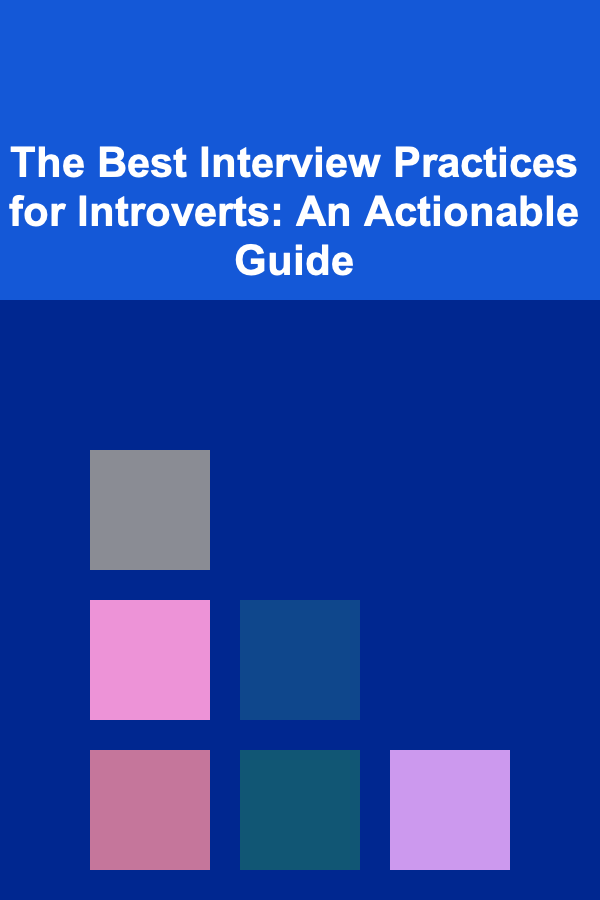
The Best Interview Practices for Introverts: An Actionable Guide
ebook include PDF & Audio bundle (Micro Guide)
$12.99$8.99
Limited Time Offer! Order within the next:

Job interviews can be nerve-wracking for anyone, but for introverts, they can feel especially challenging. The traditional interview setting often demands quick thinking, high energy, and an outgoing demeanor---all of which can be more difficult for introverted individuals. However, being introverted doesn't mean you can't excel in interviews. With the right strategies, introverts can harness their natural strengths and navigate the interview process confidently.
This guide offers actionable advice for introverts looking to succeed in interviews, highlighting key practices that can help you perform at your best, make a strong impression, and ultimately land the job you desire.
Embrace Your Strengths as an Introvert
Introverts tend to possess valuable skills that can be highly beneficial in the workplace. These include excellent listening skills, attention to detail, thoughtful reflection, and the ability to work independently. Before diving into interview preparation, take a moment to recognize and embrace the strengths that come naturally to you as an introvert.
Leverage Your Listening Skills
Introverts are typically good listeners, a quality that can be incredibly valuable in an interview. Listening carefully to the interviewer's questions allows you to respond thoughtfully and tailor your answers to what they're truly asking. This can help you stand out as a candidate who is attentive, considerate, and focused on the conversation.
Focus on Thoughtful Responses
Introverts are known for thinking before they speak, which can lead to more articulate and well-considered responses. Take advantage of this by providing detailed answers that showcase your expertise and problem-solving abilities. It's perfectly fine to take a moment to collect your thoughts before responding.
Show Your Ability to Work Independently
Many introverts excel at working independently and require little supervision. Highlight this ability in your interview by providing examples of times you successfully worked on projects or tasks on your own. This can reassure employers that you are self-sufficient and capable of managing your responsibilities without constant guidance.
Prepare Thoroughly for the Interview
For introverts, preparation is key to feeling confident and performing well in an interview. The more you can anticipate potential questions and scenarios, the more control you'll have over the conversation. Preparation helps mitigate nerves and ensures you're able to present yourself in the best light.
Research the Company and Role
Understanding the company's culture, mission, values, and the specifics of the role you're applying for can give you a solid foundation. When you know the company well, you'll be able to tailor your responses to demonstrate how your skills and experiences align with their needs. This research will also help you feel more at ease during the conversation, as you'll have a clearer understanding of what to expect.
Practice Common Interview Questions
While you can't predict every question, you can prepare for the most common ones, such as:
- Tell me about yourself.
- Why do you want to work here?
- What are your strengths and weaknesses?
- Can you describe a time when you overcame a challenge?
Prepare concise, thoughtful responses to these questions. You might also practice answering them aloud or with a trusted friend to get comfortable speaking about your experiences and qualifications.
Prepare Questions for the Interviewer
Asking questions is a great way to demonstrate your interest in the position and company. As an introvert, this also gives you a chance to shift the focus away from yourself for a moment. Prepare a few thoughtful questions, such as:
- How does the company support professional development?
- What is the team dynamic like?
- What are the biggest challenges currently facing the department?
This also provides an opportunity to gather important information about the company's environment, which can help you decide whether it's a good fit for your personality.
Practice Calm, Confident Body Language
While introverts may not naturally gravitate toward the outgoing body language often associated with extroversion, body language still plays a crucial role in conveying confidence and engagement during an interview. Introverts can use subtle but powerful body language techniques to appear confident and connected, without feeling forced or uncomfortable.
Maintain Good Posture
Sit up straight and maintain an open posture. Avoid slouching or crossing your arms, as this can signal disinterest or defensiveness. A simple trick is to keep your hands visible on the table or your lap, which can make you appear more engaged and confident.
Make Eye Contact
Eye contact is a key indicator of confidence and trustworthiness. While introverts may find it challenging to maintain eye contact for long periods, aim to make brief eye contact throughout the conversation. Looking at the interviewer's eyes occasionally shows that you're paying attention and engaged without making you feel overwhelmed.
Smile and Nod
A smile can go a long way in conveying warmth and openness. Smiling when appropriate, along with occasional nods to show that you're actively listening, can help create a positive connection with the interviewer. You don't need to overdo it; natural and subtle gestures will work best.
Use the STAR Method for Structured Answers
The STAR method is an effective technique for answering behavioral interview questions. As an introvert, using this structured approach can help you stay focused, reduce anxiety, and give clear, concise answers. STAR stands for:
- Situation: Describe the context of the situation you faced.
- Task: Explain the task or challenge you were responsible for.
- Action: Detail the specific actions you took to address the situation.
- Result: Share the outcome, highlighting what you accomplished.
By using the STAR method, you can ensure that your answers are organized, to the point, and demonstrate your problem-solving skills. This approach also helps you avoid rambling or going off-topic, which can happen when you're nervous.
Example of a STAR Answer
Question: Tell me about a time when you had to manage a difficult project.
- Situation: In my previous job, I was tasked with leading a project that involved multiple team members from different departments, which created some communication challenges.
- Task: My responsibility was to ensure the project was completed on time and that all departments were aligned on their deliverables.
- Action: I scheduled weekly check-ins, clarified communication channels, and broke the project into smaller, manageable tasks to ensure progress.
- Result: The project was completed ahead of schedule, and the improved communication process I implemented became a standard practice for future projects.
Manage Your Nerves with Mindfulness Techniques
It's natural for anyone to feel nervous before or during an interview, but for introverts, nerves can sometimes feel more intense. Fortunately, there are several mindfulness techniques you can use to manage your anxiety and stay calm during the interview process.
Deep Breathing Exercises
Before the interview starts, take a few deep breaths to calm your nerves. Deep breathing can help lower your heart rate and reduce feelings of anxiety. You can also use deep breathing during the interview to stay composed if you begin to feel overwhelmed.
Visualization
Before the interview, spend a few moments visualizing yourself succeeding. Picture yourself walking confidently into the room, answering questions with ease, and leaving the interview feeling positive about the experience. Visualization can help calm your nerves and set a confident mindset.
Grounding Techniques
If you start feeling anxious during the interview, try grounding techniques such as focusing on the sensations of your feet on the floor or your hands on the table. This can help you redirect your attention away from nervous thoughts and back to the present moment.
Follow Up with a Thoughtful Thank-You Note
After the interview, take the time to send a thank-you note. This is a simple but powerful way to reiterate your interest in the position and demonstrate gratitude for the opportunity. A thank-you note also gives you another chance to showcase your communication skills.
What to Include in Your Thank-You Note:
- Express appreciation for the interviewer's time and consideration.
- Reaffirm your enthusiasm for the role and why you believe you're a good fit.
- Mention something specific from the interview to personalize the note and show you were engaged.
- Keep it concise, polite, and professional.
Example: Dear [Interviewer's Name],
Thank you for taking the time to interview me for the [Job Title] position at [Company Name]. I enjoyed learning more about your team and the exciting projects you're working on. After our conversation, I'm even more enthusiastic about the opportunity to contribute to your company's growth. I believe my skills in [mention specific skill] would allow me to make a meaningful impact.
Thank you again for your consideration, and I look forward to hearing from you soon.
Best regards, [Your Name]
Conclusion
Interviews can be challenging for introverts, but by embracing your strengths, preparing thoughtfully, and practicing key interview strategies, you can perform confidently and effectively. Remember that introverts have a unique skill set that can be highly valued in the workplace---embracing these qualities and presenting them thoughtfully during your interview is the key to success.
With the right mindset and tools, you can navigate any interview with ease and land the job that aligns with your skills and passions.
Reading More From Our Other Websites
- [Home Renovating 101] How to Upgrade Your Central Heating System for Better Efficiency
- [Home Party Planning 101] How to Elevate Your Home Party Decor with DIY Projects
- [Organization Tip 101] How to Foster Team Collaboration in a Virtual Workspace
- [Personal Financial Planning 101] How to Protect Your Assets with Insurance
- [Organization Tip 101] How to Keep Track of Your Charitable Contributions
- [Personal Financial Planning 101] How to Build a Strong Financial Foundation in Your 50s
- [Organization Tip 101] How to Customize Your Emergency Kit for Specific Needs
- [Organization Tip 101] Step-by-Step Guide to Installing LED Recessed Lighting in Your Home
- [Personal Finance Management 101] How to Master Debt Management Strategies: A Practical Guide to Becoming Debt-Free
- [Personal Care Tips 101] How to Layer Blush with Bronzer and Highlighter for a Glowing Complexion

How to Create a Checklist for Year-Round Garden Maintenance
Read More
How to Optimize Sunlight Exposure in Your Garden Layout
Read More
How to Reduce Monthly Expenses Without Sacrificing Comfort
Read MoreHow to Set Up a Checklist for Tracking Personal Growth and Milestones
Read More
How to Set Up a Technology Help Session for Seniors
Read More
How to Conquer Errands with Kids: A Stress-Free Checklist
Read MoreOther Products

How to Create a Checklist for Year-Round Garden Maintenance
Read More
How to Optimize Sunlight Exposure in Your Garden Layout
Read More
How to Reduce Monthly Expenses Without Sacrificing Comfort
Read MoreHow to Set Up a Checklist for Tracking Personal Growth and Milestones
Read More
How to Set Up a Technology Help Session for Seniors
Read More